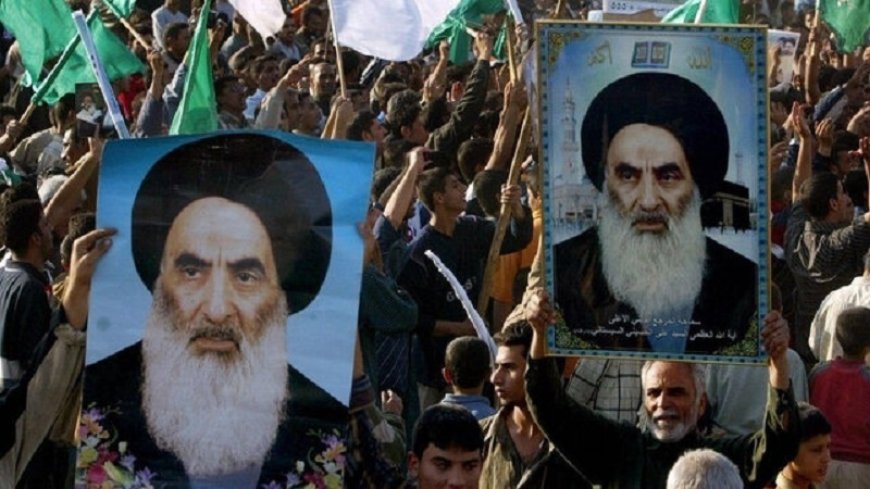Reaction Against the provocative action of Israeli Media Directing Ayatollah Sistani
Particularly in Iran and Iraq, the recent choice by Israeli media to classify Iraq's most revered Shiite cleric, Ayatollah Ali Sistani, on a terror list has caused great criticism all throughout the Muslim world. Declared in a statement by the Islamic Culture and Communication Organization of Iran, this action was characterized as both "insolent" and "provocative," an intentional affront to the Shia population and their religious authority.

Particularly in Iran and Iraq, the recent choice by Israeli media to classify Iraq's most revered Shiite cleric, Ayatollah Ali Sistani, on a terror list has caused great criticism all throughout the Muslim world. Declared in a statement by the Islamic Culture and Communication Organization of Iran, this action was characterized as both "insolent" and "provocative," an intentional affront to the Shia population and their religious authority.
This debate results from an October 8 story on Israel's Channel 14 that reportedly revealed Ayatollah Sistani as a target on the so-called "terror list" of the Zionist government. For many, this is perceived not only as an attack on one person but as a more general attempt to spark hostilities in an already conflict-torn area. Given Ayatollah Sistani's long-standing public support of the Palestinian and Lebanese causes, the timing of the broadcast among the continuing Gaza situation has added fuel to the flames.
Not only within Iraq but also all throughout the Shia Muslim world, Ayatollah Sistani is a very influential person. Respected even by some outside the Muslim world, his influence in steering Iraq's post-invasion recovery—especially in the fight against ISIS in 2003—makes him a major player. His backing was essential for the mobilization of Iraqi military and militias that finally proved to be rather important in eradicating ISIS from the nation. Given his role as a protector of both Iraqi sovereignty and Palestinian rights, analysts say Israeli and Western hostility toward him is not surprising.
The Iranian group claims that the targeting of Sistani by Israeli media results from ingrained hostility stemming back to the 2003 Iraq invasion. Particularly as Sistani has always presented the fight against Israel as not only a political but also a religious and moral obligation for Muslims worldwide, the organization claimed that the cleric's backing of the Palestinian cause has long bothered Israel and its Western backers. Sistani's comments during prior battles, particularly the wars in Gaza, pushed the whole Muslim community to band together in support of the Palestinians and Hezbollah in Lebanon, therefore aggravating Israel.
There has been quick reaction to this action. Political parties, religious organizations, and the government itself across Iraq have denounced Israel's media for this flagrant attack on one of their highest religious authority. Emphasizing Ayatollah Sistani's position as a stabilizing agent, Iraqi officials have cautioned that such careless provocations run the danger of aggravating sectarian tensions in the country.
The relevance of Ayatollah Sistani transcends only the religious domain. Many see his placement on any such list as a symbolic attempt to destroy Iraq's political and social fabric as this person has constantly argued for the rights of Iraqis. Long a voice of moderation, the cleric supports national unity and peaceful resolution of problems. In Iraq, his moral influence is still unparalleled; any attack on his person is seen as an insult to the whole Shia population and a risky action that can destabilize the country.
This debate arises at a period when tensions between Israeli-Palestinian people are near breaking point. As events like this risk to intensify already challenging to control disputes, the international community will be keenly observing how this situation evolves. Targeting Ayatollah Sistani marks an unacceptable disrespect for Iraqis and Shia Muslims all around, and any such provocations could have major effects on regional peace and stability.Strong losses for the Zionist army in the Hezbollah ambush
Following a bomb explosion, Lebanese Islamic resistance forces collided with Zionist regime troops, killing and injuring many of the latter.
The AP news agency claims that Hezbollah declared today at 03:45 that the resistance fighters exploded a device among a gathering of Zionist forces.
Later clashes between the resistance forces and this group of enemy soldiers attempting to enter the town of Ramiye resulted in numerous deaths and injuries.
In another comment, Hezbollah said that a group of enemy forces in the Tel Shaar base in northern Palestine underwent an artillery strike.
Furthermore revealed this morning by Lebanon's Hezbollah was the destruction of the missile platform of the Zionist government at the "Mailia" facility with plenty of missiles.
Two other actions of the Lebanese Islamic Resistance were the guided missile attack on the gathering place of Zionist enemy soldiers in the Zionist settlement of Al-Manara and the targeting of Zionist government soldiers around the Renty base.
Hezbollah declared that this operation claimed numerous enemy soldiers dead and injured.













































